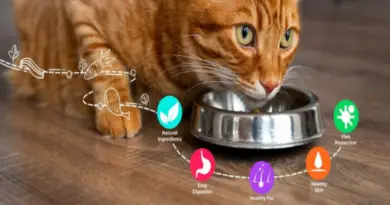Common Food Allergies in Cats
Cats, like humans, can develop food allergies that impact their health and well-being. Although less common than in dogs, food allergies in cats are still a significant concern. These allergies can cause various symptoms, ranging from skin issues to digestive problems, and often go unnoticed until they become severe. Understanding the causes, symptoms, and management of food allergies is essential for every cat owner. This article explores the common food allergies that affect cats, how to identify the signs, and what can be done to help a cat suffering from such an issue.
What Causes Food Allergies in Cats?
Food allergies occur when a cat’s immune system overreacts to certain proteins found in food. The cat’s body identifies these proteins as harmful, even though they are not, and releases antibodies to fight them off. The most common food allergens in cats include proteins found in chicken, beef, fish, and dairy products. Grains, like corn and wheat, can also trigger allergies, although protein sources are more frequently the culprit.
Some cats develop allergies after being exposed to the same food over a long period. The immune system becomes sensitive to that specific ingredient, leading to an allergic reaction. Unlike food intolerances, which involve the digestive system, food allergies involve the immune system and usually cause symptoms that affect the skin and gastrointestinal system.
Symptoms of Food Allergies
Cats with food allergies often exhibit signs that affect both their skin and digestive health. The most common symptom is itching, particularly around the face, ears, and neck. You may notice your cat scratching or licking excessively, which can lead to hair loss, redness, or open sores. Chronic ear infections, red or inflamed skin, and watery eyes can also indicate an allergic reaction.
Gastrointestinal symptoms are another key sign of food allergies in cats. These include vomiting, diarrhea, and weight loss. In some cases, cats may refuse to eat because of the discomfort caused by the allergic reaction. A cat with food allergies may also experience gas, bloating, or frequent bowel movements.
If these symptoms persist despite treatment, it’s worth considering food allergies as the cause. A veterinarian will often suggest a diet trial to help identify the specific allergen.
Diagnosing Food Allergies
Diagnosing food allergies in cats can be a time-consuming process, as it often involves ruling out other causes first, such as flea bites, environmental allergies, or skin infections. The most reliable method for diagnosing food allergies is through an elimination diet. This involves feeding the cat a diet that contains novel proteins and carbohydrates the cat has never eaten before.
This trial usually lasts 8 to 12 weeks. During this time, all other foods, treats, and flavored medications should be avoided. If the symptoms improve during the trial and reappear when the original diet is reintroduced, it confirms the presence of a food allergy.
Once the allergen is identified, the cat’s diet must be adjusted to avoid that specific ingredient. Some pet owners choose hypoallergenic diets, which contain hydrolyzed proteins that are less likely to trigger an immune response.
Managing Food Allergies
Managing food allergies in cats involves strict dietary control. Once the offending ingredient is identified, it must be permanently removed from the cat’s diet. This means carefully reading food labels and avoiding treats or supplements that contain the allergen. Many commercial cat foods offer hypoallergenic or limited ingredient options, which can be helpful in managing the condition.
It’s also essential to ensure that your cat’s diet remains nutritionally balanced, especially when avoiding certain ingredients. Consult a veterinarian to create a feeding plan that meets all of your cat’s nutritional needs while avoiding the allergen. In severe cases, a prescription diet may be necessary to manage the condition.
Additionally, some cats with food allergies may benefit from omega-3 fatty acids or other supplements that support skin health and reduce inflammation. Regular veterinary checkups will help ensure that your cat’s condition is well-managed and that no new allergies develop over time.
Food allergies in cats, though less common than in dogs, can cause significant discomfort and health issues if left untreated. Understanding the causes and symptoms of these allergies can help cat owners take proactive steps to identify and manage the problem. Early detection through an elimination diet is key to ensuring a cat lives comfortably and healthily. With proper management and a carefully controlled diet, cats with food allergies can still enjoy a high quality of life without the distress of allergic reactions.




